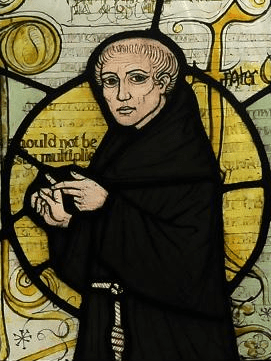It was on this day in 1328 that William of Occam, together with the minister general of their Franciscan order and two other leaders fled the papal court at Avignon, confident if they stayed they would be condemned as heretics and executed at the order of the pope. The condemnation indeed followed, but without a body to burn, there was no death sentence…
The issue at the moment was the extent of papal authority. While of importance to the development of the relationship between church and state, this is not what makes me interested in this medieval friar. Rather, the reason I care, and really care, is that William by throwing a couple of wrinkles into scholastic thought, would be critical in the advance of both philosophy and science. The consequences of his thinking would play out in major ways for many people, perhaps it is not overstating the point, by saying of enormous consequence to our world and all seeking the truth of the thing.
Wikipedia’s article on William states the important point with moderate clarity.
“One important contribution that he made to modern science and modern intellectual culture was efficient reasoning with the principle of parsimony in explanation and theory building that came to be known as Occam’s Razor. This maxim, as interpreted by Bertrand Russell, states that if one can explain a phenomenon without assuming this or that hypothetical entity, there is no ground for assuming it, i.e. that one should always opt for an explanation in terms of the fewest possible causes, factors, or variables. He turned this into a concern for ontological parsimony; the principle says that one should not multiply entities beyond necessity – Entia non sunt multiplicanda sine necessitate – although this well-known formulation of the principle is not to be found in any of Ockham’s extant writings. He formulates it as: “For nothing ought to be posited without a reason given, unless it is self-evident (literally, known through itself) or known by experience or proved by the authority of Sacred Scripture.””
There we see how this principle has theological consequences, particularly as people see the principle is equally profitable when applied to the assertions made within the scriptures. However, at the time, as the Wikipedia article notes.
“For Ockham, the only truly necessary entity is God; everything else is contingent. He thus does not accept the principle of sufficient reason, rejects the distinction between essence and existence, and advocates against the Thomistic doctrine of active and passive intellect. His scepticism to which his ontological parsimony request leads appears in his doctrine that human reason can prove neither the immortality of the soul nor the existence, unity, and infinity of God. These truths, he teaches, are known to us by revelation alone.”
For me Occam is a prophet guiding us toward the holy land. But, he doesn’t himself get to cross over the river. Still, his rejection of essences, of platonic ideals, his relentless looking into the matter as it presents is breath taking. And I’m so grateful.
Occam’s razor cuts through a great deal of nonsense and points us toward the real thing.
The thing in itself.
Of enormous value both, I would say, for knowing the world, and for knowing our own heart and mind.
Now, it doesn’t appear he was in fact the first to notice the power of philosophical parsimony, but he wielded that razor with close to the same abandon as Sweeney Todd leaving in his wake a lot of meat pies…
And tasty though they may be, just meat pies, leaving us to see what is left with clarity, or, at least, a lot more clarity.
For me it has been a way to sort through the many truth claims presented by the religions of the world, and allowing me to set aside the larger majority of them as somewhere in the highly unlikely area, and to instead focus on those that by their simplicity and clarity have a better chance of being true.
Now, of course, the simplest explanation is not always the right one. But, if someone multiplies the universe in suggesting the reason something happens the onus is on that person to justify the more complex explanation.
And, again, in my life, this has give me the space to focus on the more likely.
And, for my heart, it has led me to a great feast, for which I will never cease to be grateful.
I have to say my path has been greatly helped by the wisdom of Occam’s razor, and I, for one, am glad he fled the clutches of the pope and continued his work.













